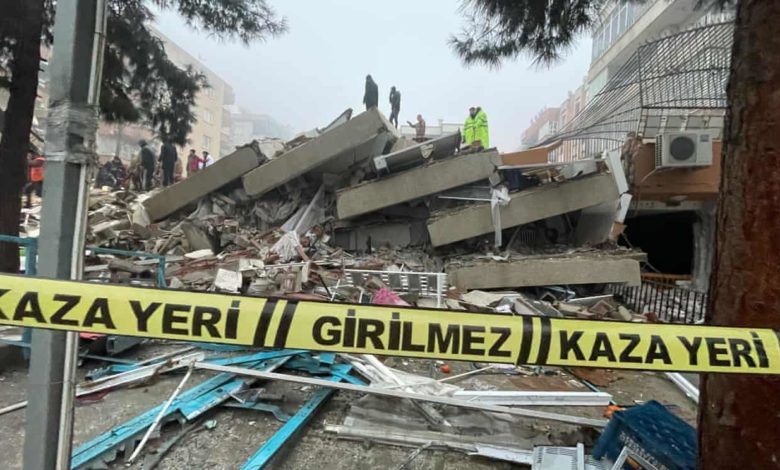
More than 300 people died in Turkey and Syria when a 7.8 magnitude earthquake struck early Monday morning, in one of the region’s most catastrophic quakes in at least a century.
Hundreds of people were hurt, and the death toll was expected to grow as rescue workers and locals frantically searched for survivors beneath the rubble of collapsed buildings on both sides of the border.
The quake struck at 04:17 a.m. local time (0117 GMT) at a depth of roughly 17.9 kilometres (11 miles), according to the US Geological Survey, and was followed by a 6.7-magnitude aftershock 15 minutes later. The quake struck Pazarck, an hour north of Gaziantep, an important industrial hub in southern Turkey, according to Turkey’s emergency management ministry, the AFAD. The epicentre of the second tremor was 80 kilometres (50 miles) south-west of Nurda.
Images on television showed stunned citizens in Turkey standing in the snow in their pyjamas, watching rescuers rummage through the debris of destroyed homes. Buildings were demolished when many people were still sleeping.
On Monday morning, the number of verified casualties increased swiftly as rescue workers tried to discover survivors.
Turkey’s AFAD reported at least 76 deaths and hundreds of injuries in seven southern provinces near the border with northern Syria. The Syrian health ministry reported at least 245 deaths and hundreds of injuries in the provinces of Aleppo, Latakia, Hama, and Tartus.
The death toll was likely to rise significantly as scores of apartment buildings were destroyed throughout major cities during the nocturnal calamity.
Tremors might be felt as far out as Lebanon, Greece, Israel, and Cyprus.
According to Turkey’s Anadolu news agency, the governor of the southern province of Anlurfa reported 15 deaths and 30 injuries. At least 23 people were killed, 420 were injured, and 140 structures were demolished in Malatya, a town 225 kilometres (140 miles) north-east of Gaziantep, according to the local governor.
The Turkish Red Cross chief said the organisation was mobilising supplies for the region and urged people to flee damaged homes.
Residents in the town of Pazarck expressed concern for those trapped beneath collapsed buildings. The severe earthquake shocks, according to Nihat Altunda, awoke his family.
“Our house appears to be solid from the exterior, but there are fissures on the interior. Buildings are being demolished all around me, and houses are on fire. There are some buildings that are crumbling. Just 200 metres from where I am now, a building fell. “Thank God, our friends are okay, but we’ve heard that there are people who can’t leave their homes and others who we can’t reach,” he said.
“We’re waiting for the sun to rise so we can see the magnitude of the earthquake. Everyone is outdoors, terrified.”
“Pazarcik is in ruins,” claimed Hüseyin Sat, a local. “The building where I live is not that tall, and was built in conformity with earthquake laws, therefore it didn’t collapse. However, there are still fissures in the walls. “During the earthquake, a neighbour of mine hurt his back when jumping from the balcony and is currently in the hospital.”
Civilians, according to Sat, were feverishly trying to assist dig their neighbours out from under collapsed buildings.
“Two of my pals are currently under the rubble, and we are attempting to reach them,” he said.
Turkey is located in one of the world’s most active earthquake zones, with territory spanning across the Anatolian fault line in the country’s north, causing massive and deadly shocks.
In 1999, a 7.4 magnitude earthquake shook Izmit and the adjacent Kocaeli region near Istanbul, the worst to hit Turkey in decades.
In the midst of enormous devastation, the earthquake killed approximately 17,000 people, including at least 1,000 in Istanbul.
Experts have long warned that a massive earthquake might damage Istanbul, which has allowed for enormous construction without safety protections.
In January 2020, a magnitude-6.8 earthquake struck Elaz, killing about 40 people. In October of that year, a magnitude 7.0 earthquake struck the Aegean Sea, killing 114 people and injuring over 1,000.
Naci Gorur, an earthquake expert from Turkey’s Academy of Sciences, encouraged local officials to inspect the region’s dams for fractures quickly in order to avoid possibly catastrophic floods.
















